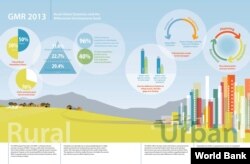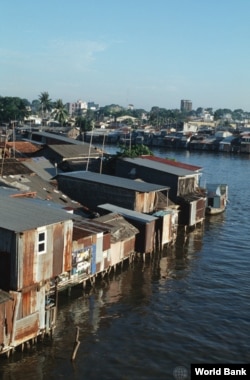WASHINGTON,DC —
The U.N.’s ambitious global effort – the Millennium Development Goals – ends in two years. The program was designed to curb poverty and promote education, health and gender equality. The World Bank says many of the countries that have made the most progress so far have an important factor working in their favor: urbanization. The conclusion was part of the bank’s recent Global Monitoring Report 2013.
It says countries and regions with a high rate of urbanization lead in the effort to reach their Millennium Development Goals (or MDGs). For example, countries with large population centers in East Asia, like China, have made significant progress in reducing poverty.
Lagging behind is sub-Saharan Africa, where about 70 percent of the population still lives in rural areas.
Figures reflect the disparity between cities and the countryside: The World Bank says urban infant mortality rates are up to nine percentage points lower than rural areas in Central Asia and Latin America. By comparison, the gap is as wide as 21 percent in sub-Saharan Africa.
Jos Verbeek, the lead economist of the Global Monitoring Report 2013, says there are many reasons why urban areas are quicker to make social progress.
"[Cities]," he says, "are centers of economic activity, growth and job creation; consequently, poverty is significantly lower in urban centers than in rural areas."
For example, globally poverty in rural areas stands at about 29.5 percent, while it’s only 11.5 percent in urban areas. In Africa, rural poverty is about 47 percent versus 33 percent in urban areas.
He says urban areas are also better at service delivery…. For example, access to sanitation [such as toilets] is about 80 percent in urban areas and about 50 percent in rural ones. In Africa, about 40 percent of the population in urban areas have access to a toilet, while only half that amount have access in rural areas.
Verbeek says cities also benefit from greater density, or economies of scale, which makes it easier to extend social services like health, education, electricity and water.
For example, he says it’s cheaper to extend pipes for water and sanitation from the city network to new settlements on the periphery than it is to run pipes tens or hundreds of kilometers to rural areas.
While urbanization can greatly facilitate economic and social progress, Verbeek warns that unchecked city growth can quickly lead to slums. He says governments should use urban planning, including policies that increase the transparency of buying and selling land.
"If you are not property registered as a citizen of an urban area, " he says, "you often don’t have access to government services. You might get turned away at a public health clinic in an urban area because you cannot prove residency, and that is a big issue for many people who end up in slums."
"The other is thing," he continued, "is uncertainly about where you are living. If there is uncertainty [over land ownership], then public providers will not come in and extend water pipes into the slums – because no one knows for sure if the slums will still be there a year from now. Government might [decide to] empty them out, which in certain countries has happened in the past.
In both cities and rural areas, a major factor in improving health and social services is financing. World Bank officials encourage countries with oil and minerals to use revenues from those resources to finance health and education systems.
At the recent World Bank and IMF Spring meetings, African policymakers debated how best to fund social services. Some favored greater state support and financing of health and education systems, while others preferred a combination of public and private financing.
Uganda’s minister of finance, Maria Kiwanuka, explains her government’s policy:
"We have a finite resource of oil," she says, "We are not Nigeria, or Venezuela and certainly not Saudi Arabia. So our oil will run for a certain amount of time and then run out. Then what? We must make sure our investments are sustainable and increasing so we can pay an increasing amount of our share of the health and education budget. Our budget for health has been growing ever year. If we use the oil for health immunizations, medicines and salaries, then what about next year and the year after?"
Kiwanuka says the Ugandan government spends up to 10 percent of its budget on health and up to 15 percent on education. She says it prefers to spend its oil revenues on improving irrigation, electricity and other infrastructure in rural areas. She says that will allow rural people to make more money and contribute to the health care system.
She says there are trade-offs.
"So for health," she says, "we’ve said rather than emphasizing quick access to health care – let’s say a health unit within 15 minutes of every habitation – we’ve said, what if you have to walk a little bit longer, but then when you get to that health care center, it’s actually stocked with drugs and health personnel to look after you, rather than have clinic around the corner that doesn’t have any supplies?"
Kiwanuka says people are willing to pay to go to traditional doctors and herbalists because they believe in them. She says if they have faith in the government health care system, they should be willing to pay for its services as well.
Jos Verbeek says there are many different ways to fund health and social services and curb poverty. The important thing, he says, is that resources be available – either directly or indirectly – to improve the health and education of rural people. He says it will help improve their job skills and make their transition easier, if they decide to migrate to a city.
It says countries and regions with a high rate of urbanization lead in the effort to reach their Millennium Development Goals (or MDGs). For example, countries with large population centers in East Asia, like China, have made significant progress in reducing poverty.
Lagging behind is sub-Saharan Africa, where about 70 percent of the population still lives in rural areas.
Figures reflect the disparity between cities and the countryside: The World Bank says urban infant mortality rates are up to nine percentage points lower than rural areas in Central Asia and Latin America. By comparison, the gap is as wide as 21 percent in sub-Saharan Africa.
Jos Verbeek, the lead economist of the Global Monitoring Report 2013, says there are many reasons why urban areas are quicker to make social progress.
"[Cities]," he says, "are centers of economic activity, growth and job creation; consequently, poverty is significantly lower in urban centers than in rural areas."
For example, globally poverty in rural areas stands at about 29.5 percent, while it’s only 11.5 percent in urban areas. In Africa, rural poverty is about 47 percent versus 33 percent in urban areas.
He says urban areas are also better at service delivery…. For example, access to sanitation [such as toilets] is about 80 percent in urban areas and about 50 percent in rural ones. In Africa, about 40 percent of the population in urban areas have access to a toilet, while only half that amount have access in rural areas.
Verbeek says cities also benefit from greater density, or economies of scale, which makes it easier to extend social services like health, education, electricity and water.
For example, he says it’s cheaper to extend pipes for water and sanitation from the city network to new settlements on the periphery than it is to run pipes tens or hundreds of kilometers to rural areas.
While urbanization can greatly facilitate economic and social progress, Verbeek warns that unchecked city growth can quickly lead to slums. He says governments should use urban planning, including policies that increase the transparency of buying and selling land.
"If you are not property registered as a citizen of an urban area, " he says, "you often don’t have access to government services. You might get turned away at a public health clinic in an urban area because you cannot prove residency, and that is a big issue for many people who end up in slums."
"The other is thing," he continued, "is uncertainly about where you are living. If there is uncertainty [over land ownership], then public providers will not come in and extend water pipes into the slums – because no one knows for sure if the slums will still be there a year from now. Government might [decide to] empty them out, which in certain countries has happened in the past.
In both cities and rural areas, a major factor in improving health and social services is financing. World Bank officials encourage countries with oil and minerals to use revenues from those resources to finance health and education systems.
At the recent World Bank and IMF Spring meetings, African policymakers debated how best to fund social services. Some favored greater state support and financing of health and education systems, while others preferred a combination of public and private financing.
Uganda’s minister of finance, Maria Kiwanuka, explains her government’s policy:
"We have a finite resource of oil," she says, "We are not Nigeria, or Venezuela and certainly not Saudi Arabia. So our oil will run for a certain amount of time and then run out. Then what? We must make sure our investments are sustainable and increasing so we can pay an increasing amount of our share of the health and education budget. Our budget for health has been growing ever year. If we use the oil for health immunizations, medicines and salaries, then what about next year and the year after?"
Kiwanuka says the Ugandan government spends up to 10 percent of its budget on health and up to 15 percent on education. She says it prefers to spend its oil revenues on improving irrigation, electricity and other infrastructure in rural areas. She says that will allow rural people to make more money and contribute to the health care system.
She says there are trade-offs.
"So for health," she says, "we’ve said rather than emphasizing quick access to health care – let’s say a health unit within 15 minutes of every habitation – we’ve said, what if you have to walk a little bit longer, but then when you get to that health care center, it’s actually stocked with drugs and health personnel to look after you, rather than have clinic around the corner that doesn’t have any supplies?"
Kiwanuka says people are willing to pay to go to traditional doctors and herbalists because they believe in them. She says if they have faith in the government health care system, they should be willing to pay for its services as well.
Jos Verbeek says there are many different ways to fund health and social services and curb poverty. The important thing, he says, is that resources be available – either directly or indirectly – to improve the health and education of rural people. He says it will help improve their job skills and make their transition easier, if they decide to migrate to a city.







